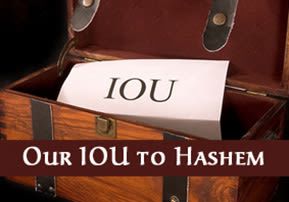
Our IOU to Hashem
When a Jew performs a mitzvah, he receives a spiritual deposit into his account. When he receives a blessing from Hashem, G-d makes a withdrawal. This applies to all of us...

In Tractate Berachos, the Gemara relates Jewish greatness to the pumpkin. As a pumpkin grows, it sinks deeper into the ground. This is the way a Jew is supposed to grow. As our status is raised, we are supposed to sink further. Like King David, and Moshe Rabbenu, the higher we climb, the more humble we are supposed to become.
Why?
When we accomplish something in life, especially after working our hearts out, aren’t we entitled to a little credit? If we reach a position of authority where others are relying on our good judgment, aren’t we supposed to make decisions with confidence? After all, our actions impact the welfare of our family, friends, and business. Why are we supposed to become humble with success?
I am unworthy of all the kindnesses and of all the truth that You have done with Your servant. (Genesis, 32:11)
This is Jacob our father talking to Hashem upon leaving the house of Laban and returning to the Land of Israel. He left his family 34 years earlier, after he secured the birthright from his father Yitzchak. His brother Esau wanted to kill Jacob upon his return for “stealing” the  birthright. Jacob beseeched Hashem for mercy. He told G-d that he was unworthy of what he had, how could he ask for further Salvation?
birthright. Jacob beseeched Hashem for mercy. He told G-d that he was unworthy of what he had, how could he ask for further Salvation?
Didn’t Jacob learn Torah at the Yeshiva of Shem and Ever for 14 years? Didn’t he just raise a large family by being hired help for 14 years, working under adverse conditions making minimum wage? Can you imagine the level of emunah Jacob must have maintained all this time? How can he call himself unworthy?
When a Jew performs a mitzvah, he receives a spiritual deposit into his account. When he receives a blessing from Hashem, G-d makes a withdrawal. This applies to all of us. All the good we do in this world is supposed to “cover” all the good we receive. From complete poverty, Jacob left the house of Lavan a billionaire. When he left, Lavan chased him, preparing to end his life. Hashem came to Lavan in a dream and warned him not to touch His beloved. Jacob must have thought that the blessings which kept him alive, wealthy, and with many holy offspring far outweighed the mitzvoth he performed.
Hashem still blessed Jacob with a miracle. He survived the encounters with Lavan, and then Esau unscathed.
In Duties of the Heart, we are told that all the good deeds we could possibly do in this world do not add up to so much as a single favor Hashem does for us. If we still receive blessings from Hashem based on the Mercy that one of our mitzvoth equals one of His, we discover that following just one commandment of G-d is a treasure worth more than anything we can calculate in this existence.
When we receive money, influence, and success, we cannot become haughty. We must understand that we are drawing down merit from above and become even more focused on replenishing our account. It is human nature to fall into the most obvious trap the Evil Inclination sets out for us after any material triumph – complacency.
It is not up to us to overcome this temptation, like the pumpkin we must sink beneath it.
We must remember that all of the people we have “leapfrogged” in life likely have more Divine merit to their spiritual account now. On the surface it may appear as if it is their time to placate us. In reality, it is now time for us to placate them.
The greatest Jewish leaders were humble because they knew their greatness implied that spiritually, they were back at square one. They had the merit of a 13 year old just beginning to put on tefillin for the very first time. They would have to work even harder to bring their level back to where it was.
Today’s world is no different. We are in a crisis where every amount of spiritual merit is vital to our survival.
It is up to us to understand that each time a Qassam misses its target we all need to put something back. With every terrorist attack thwarted, we need to replenish the account. For every day the world around us implodes yet Israel continues to endure, it is up to us to show Hashem with our learning, kindness, teshuva, and emuna that we are more than aware of our unfathomable IOU to Hashem!
* * *
Dovber Halevi is the author of Sex, Religion, and the Middle East, a book aboutpersonal holiness and happiness. He lives in Israel with his wife and three children.











Tell us what you think!
Thank you for your comment!
It will be published after approval by the Editor.